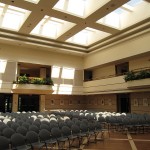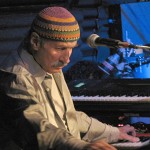From Mozart to Michael Jackson

Photo courtesy of Gryffindor under the Creative Commons Attribution-Share Alike 3.0 Unported license.
The Austrian Embassy’s giant reception room was packed. Row upon row of quiet guests in formal evening attire sat beneath a wide, glassy sunroof allowing the last rays of the sun to soak quietly into the dim room. Even the people in blue and red in the paintings lining the walls seemed to be waiting. The stage was set and lit and an older woman with short, blonde hair took the microphone, “This is my last cultural event,” Andrea Schrammel, the Director of the Austrian Cultural Forum Washington, informed the waiting audience. Even though she had spoken these words several times before, it was much more real this time, as the Austrian government was calling her back to Vienna after four years in the United States.
After her brief introduction of the event, a musical duet by famed Jazz piano composer Michael Kahr and violin prodigy Barbara Helfgott, Wikimedia DC‘s own Nicholas Bashour, in a turquoise button shirt that matched the blues in some of the art around the room, took the stage as a sponsor of the event and told the expectant audience that this event is only the tip of the iceberg, that Wikimedia DC is active and looking for more opportunities to reach out to the international crowd.
Applauding, the people fell silent when Kahr, tall with a fitted black suit and mahogany hair feathering his neck, stepped out of the backroom alone and took the ready stage. Without preamble he sat down at the waiting piano and began. Soft and classical notes met strains of improvisation in a dizzying way as the last of the sunlight faded from the room and the only light came from the beams concentrated on the man and his piano.
After two songs, he finally arose, bowed to the applause, and addressed the audience saying how wonderful it was to be there that night and to introduce Barbara Helfgott as “the future of Austrian music”. She came striding out of the backroom in six inch sparkly white heels, sleeveless black dress that went to the top of the knees, and a brilliant smile, holding out her violin and bow as she crossed to center stage.
Nodding to the sound technician to her left and clenching the violin between her chin and shoulder, she smiled at Kahr and winked at the audience as the bada-tss of percussiondrums and other instruments began to throb from the speakers and wash out over the audience like the beginning ripples of a rising tide. Then Kahr joined in with the piano, moving back and forth on the seat, shoulders keeping the beat along with his fingers as they ran across the keys. Nodding and tapping her toes, Helfgott moved in, the first few notes screaming out from the violin like lost souls. The audience began to look restless, phones were brought out, someone left the room with fingers in her ears. Yet Helfgott smiled and turned to Kahr, nodding almost imperceptibly, and the real music began.

Austrian pianist Michael Kahr and Austrian violinist Barbara Helfgott, photo by Nicholas Michael Bashour, CC BY-SA 3.0
For forty or so minutes straight, Helfgott and Kahr coaxed wild and beautiful melodies from the piano and violin, intertwining and separating them from the background music thumping from the speakers. After finishing the first set, they returned for not one, but two encore performances. During the first encore, Helfgott introduced the next song, “I’m So Excited,” by taking the microphone and giving a short speech about how excited she was to be at the embassy, how excited the embassy people were to have her and Kahr, and she knew the audience was super excited, too. Then, Helfgott turned to the audience and said, “well, this concert is called From Mozart to Michael Jackson. There hasn’t been any Mozart, but, we have Michael Jackson,” after which she and Kahr played the finalist song: “Billie Jean” by Michael Jackson.
After the romping musical escapade during which Kahr shook his shoulders to the music and Helfgott danced as she played her violin, Helfgott and Kahr returned for a final encore, this time, a request from the audience. “Mozart, Mozart!” the audience chimed in, but, unfortunately, according to Helfgott, “Mozart did not really write a lot of pieces for piano and solo violin.” As a compromise, she played, on her own, a rendition of one of Mozart’s most famous and challenging arias, “Der Hölle Rache kocht in meinem Herzen” from the opera “Die Zauberflöte” (The Magic Flute).
After the concert, everyone broke for food and wine, and during the reception we had the opportunity to briefly interview these two great musicians.
Barbara Helfgott, with her amazing showmanship, got her start on the violin at the tender age of 5, and by 10/11, she was already winning contests and attending university classes for the musically gifted. After being turned away from philharmonics because “women can’t play the same as men,” she resolved to create her own philharmonic ensemble. And she did: the Rondo Vienna, a group of up to 25 women musicians that travels Europe and, in 2007, won the Austrian Show Award.
Although she doesn’t have a favorite location where she would love to play, she does want to play wherever there are “people who love music. There is a symbiosis between musician and audience: the musician expresses themselves through their music and the audience takes and gives back, in turn expressing themselves through listening.”

Joe Zawinul
Photo courtesy of Wikimedian, under the Creative Commons Attribution-Share Alike 3.0 Unported license.
Michael Kahr first became attached to jazz when he heard the music of Joe Zawinul, an Austrian-American jazz keyboardist and composer. With jazz, he says that “the music itself draws you in. It is a musical language, there are no definitive differences you can point to between Austrian, African, Australian, and American jazz even if there are some researchers now trying to find those differences.” And he has been all of those places in search of musical inspiration, studying jazz wherever he goes.
“When I was young, I knew I wanted to travel,” he added. He has visited America (the birthplace of jazz), Africa, the Middle East, and Australia in order to find traditional instruments, gather inspiration, and experience the music scene in those countries as well.
As the guests slowly trickled out from the embassy into the humid blanket of night with the orange glow of incandescent bulbs behind them, and those who live at the embassy climbed the stairs to their living quarters, no one had a cross word to say, or a regret for coming. Bridging cultures and languages, bringing people together to connect ideas, Wikimedia’s Embassy Outreach Initiative’s second event left everyone moon walking away with thrumming hearts and dancing minds.
Lisa Marrs, Outreach & Program Coordination, Wikimedia DC
